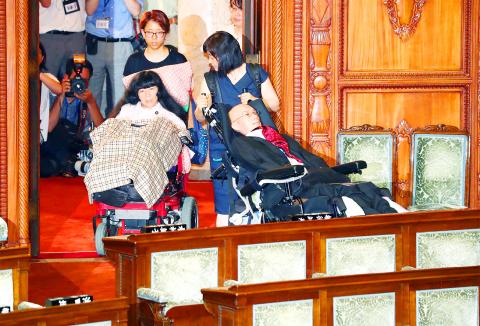Two lawmakers with serious paralysis yesterday took their seats in the Japanese House of Councilors to cheers from supporters, marking the first time people with severe disabilities have served in the body.
Yasuhiko Funago and Eiko Kimura last month won seats in the country’s upper house election and their use of special reclining wheelchairs has required modifications to the Diet.
The pair both rely on caretakers for support and their election has highlighted that Japan only pays for such care if the disabled person is not working.

Photo: AFP / Jiji Press
The lawmakers and disabled rights activists have said that this effectively penalizes those with disabilities who want to work.
The House of Councilors has agreed to pay for Funago and Kimura’s caretakers, but the new lawmakers want the rules changed more broadly.
“It will take a long time to change the system, but we will work hard in parliament to correct this big problem,” Kimura told cheering supporters outside the Diet as the new legislative session began.
“I am surprised that so many people came here,” added Funago, speaking with help from his caretaker. “I will do my best to live up to everyone’s expectations.”
A special temporary ramp allowed the lawmakers to ceremonially enter through the main gate of the Diet, opened only on these special days.
However, to reach the main chamber, they had to re-enter through a back door to access the only elevator.
Diet officials have said that they would do their best to accommodate the new lawmakers, but warned there were limits.
“It’s technically difficult to install a slope and lift connecting the main entrance to the chamber ... because the building is very old, built when the word ‘barrier-free’ was unknown,” an official told reporters.
However, other accommodations have been made, including removing seats to make space for the special wheelchairs used by the lawmakers and changing the rules to allow their caretakers to be present during sessions.
The renovations have cost ¥880,000 (US$8,062).
The two lawmakers, who won seats on the ticket of a new small opposition party, are both largely paralyzed from the neck down.
Kimura, 54, is paralyzed from the neck down, except for her right hand.
Funago, 61, is the first person with amyotrophic lateral sclerosis to be elected to the Diet.
He cannot speak and communicates by blinking to his caretaker or using a computer system operated by his mouth.
The Japanese Cabinet Office has said that there are 9.63 million people in the country with physical, mental, or intellectual disabilities.
However, while the country is preparing to host the Paralympics next year, some activists have said that people with disabilities remain marginalized in Japan and have hailed Funago and Kimura’s election as a win for representation and visibility of the community.

In the sweltering streets of Jakarta, buskers carry towering, hollow puppets and pass around a bucket for donations. Now, they fear becoming outlaws. City authorities said they would crack down on use of the sacred ondel-ondel puppets, which can stand as tall as a truck, and they are drafting legislation to remove what they view as a street nuisance. Performances featuring the puppets — originally used by Jakarta’s Betawi people to ward off evil spirits — would be allowed only at set events. The ban could leave many ondel-ondel buskers in Jakarta jobless. “I am confused and anxious. I fear getting raided or even

POLITICAL PATRIARCHS: Recent clashes between Thailand and Cambodia are driven by an escalating feud between rival political families, analysts say The dispute over Thailand and Cambodia’s contested border, which dates back more than a century to disagreements over colonial-era maps, has broken into conflict before. However, the most recent clashes, which erupted on Thursday, have been fueled by another factor: a bitter feud between two powerful political patriarchs. Cambodian Senate President and former prime minister Hun Sen, 72, and former Thai prime minister Thaksin Shinawatra, 76, were once such close friends that they reportedly called one another brothers. Hun Sen has, over the years, supported Thaksin’s family during their long-running power struggle with Thailand’s military. Thaksin and his sister Yingluck stayed

Kemal Ozdemir looked up at the bare peaks of Mount Cilo in Turkey’s Kurdish majority southeast. “There were glaciers 10 years ago,” he recalled under a cloudless sky. A mountain guide for 15 years, Ozdemir then turned toward the torrent carrying dozens of blocks of ice below a slope covered with grass and rocks — a sign of glacier loss being exacerbated by global warming. “You can see that there are quite a few pieces of glacier in the water right now ... the reason why the waterfalls flow lushly actually shows us how fast the ice is melting,” he said.

RESTRUCTURE: Myanmar’s military has ended emergency rule and announced plans for elections in December, but critics said the move aims to entrench junta control Myanmar’s military government announced on Thursday that it was ending the state of emergency declared after it seized power in 2021 and would restructure administrative bodies to prepare for the new election at the end of the year. However, the polls planned for an unspecified date in December face serious obstacles, including a civil war raging over most of the country and pledges by opponents of the military rule to derail the election because they believe it can be neither free nor fair. Under the restructuring, Myanmar’s junta chief Min Aung Hlaing is giving up two posts, but would stay at the